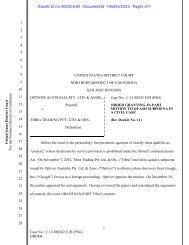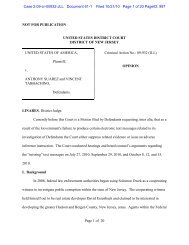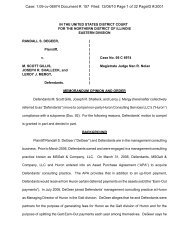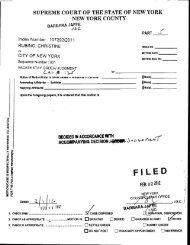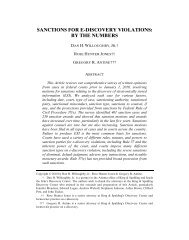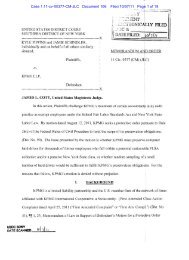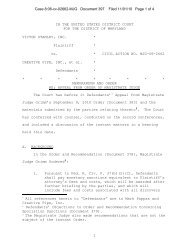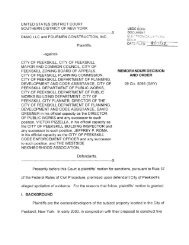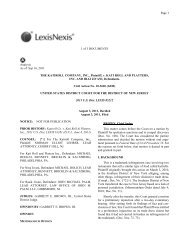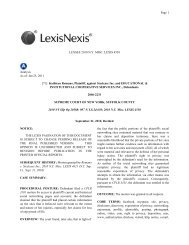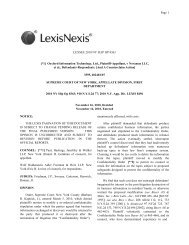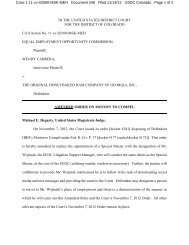Rimkus Consulting Group Inc. v. Cammarata - Ballard Spahr LLP
Rimkus Consulting Group Inc. v. Cammarata - Ballard Spahr LLP
Rimkus Consulting Group Inc. v. Cammarata - Ballard Spahr LLP
You also want an ePaper? Increase the reach of your titles
YUMPU automatically turns print PDFs into web optimized ePapers that Google loves.
Case 4:07-cv-00405 Document 450 Filed in TXSD on 02/19/10 Page 110 of 139<br />
preclusion should not apply because the party sought to be<br />
bound did not have an adequate opportunity or incentive to<br />
obtain a full and fair adjudication in the first proceeding. Such<br />
a refusal to give the first judgment preclusive effect should not<br />
occur without a compelling showing of unfairness, nor should<br />
it be based simply on a conclusion that the first determination<br />
was patently erroneous. But confined within proper limits,<br />
discretion to deny preclusive effect to a determination under the<br />
circumstances stated is central to the fair administration of<br />
preclusion doctrine.<br />
Id.; see also Metro. Sav. & Loan Ass’n v. Tarter, 730 S.W.2d 1, 5 (Tex. App.—Dallas 1987,<br />
writ granted) (citing § 28(5) for the rule that an issue is not precluded if there is a clear need<br />
for redetermination due to misconduct on the part of an opposing party that prevented a full<br />
and fair adjudication of the original action), rev’d on other grounds, 744 S.W.2d 926 (Tex.<br />
1988). The Louisiana Supreme Court has cited the Restatement for the proposition that<br />
preclusion 40<br />
does not apply, even when the elements are met, “if it is clearly and<br />
convincingly shown that the policies favoring preclusion of a second action are overcome<br />
for an extraordinary reason.” Terrebonne Fuel & Lube, <strong>Inc</strong>. v. Placid Refining Co., 95-0654<br />
(La. 1/16/96); 666 So. 2d 624, 632 (La. 1996) (citing RESTATEMENT (SECOND) OF<br />
JUDGMENTS § 26).<br />
In the present case, weighing the policies underlying preclusion law against the<br />
evidence that the defendants spoliated evidence relevant to the misappropriation claims, this<br />
40<br />
In Terrebonne, the Louisiana Supreme Court identified the question as issue preclusion but cited the<br />
Restatement (Second) of Judgments section applicable to claim preclusion. See 666 So. 2d at 632. In any<br />
event, Louisiana law considers both under the umbrella of “res judicata.” Courts have interpreted “res<br />
judicata” in Louisiana statutes to encompass both claim and issue preclusion. See Am. Med. Enters., <strong>Inc</strong>. v.<br />
Audubon Ins. Co., 2005- 2006, p. 6 (La. App. 1 Cir. 6/8/07); 964 So. 2d 1022, 1028. In Terrebonne, the court<br />
referred only to the “common law theory of res judicata.” See Terrebonne, 666 So.2d at 632.<br />
110



